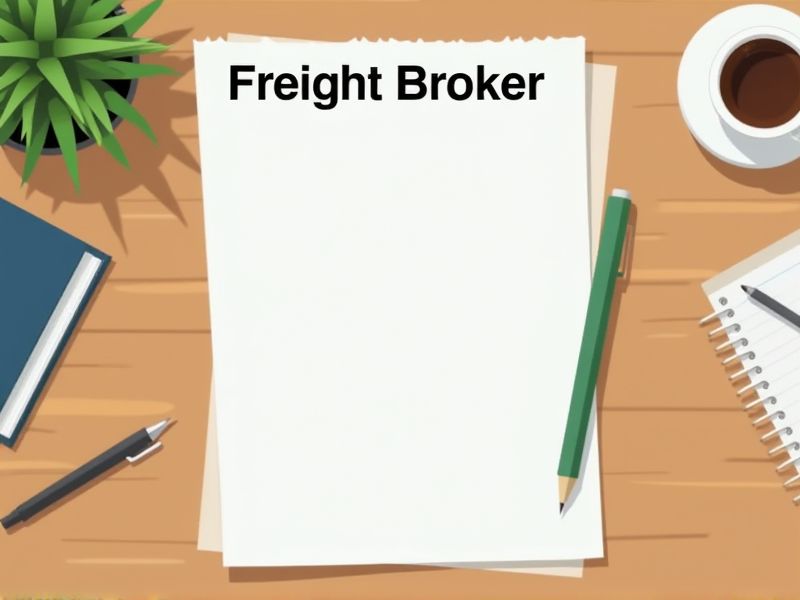
Freight brokers act as intermediaries, facilitating transactions between shippers and carriers, and must ensure compliance with industry standards to maintain trust and efficiency. Certifications validate a broker's expertise, ensuring they are knowledgeable about logistics, regulations, and best practices, enhancing their credibility. Without certain certifications, a broker might face operational inefficiencies, legal repercussions, or lost business opportunities. Listed below are key certifications crucial for a Freight Broker.
FMCSA Freight Broker Authority License
The FMCSA Freight Broker Authority License is mandated to legally operate as a freight broker in the United States. This license ensures compliance with federal regulations, promoting fair trade and accountability in the transportation industry. Obtaining the license is crucial in securing financial protection for shippers and carriers through mandatory surety bonds. The requirement enhances industry standards, fostering trust and reliability among stakeholders involved in freight transactions.
Process Agent (BOC-3) Designation Certification
The BOC-3 Process Agent Designation Certification is required because it ensures that a freight broker has a legal representative in each state for receiving legal documents. Compliance with U.S. federal regulations mandates that freight brokers have a process agent, which the BOC-3 filing certifies. The certification, thus, facilitates efficient legal communication and accountability in case of litigation or claims. Not fulfilling this requirement can lead to legal barriers in operating as a freight broker, affecting business continuity and credibility.
Freight Broker Bond Certification
Freight Broker Bond Certification ensures compliance with government regulations, fostering trust within the industry. This certification protects shippers and carriers from potential financial losses caused by broker misconduct. It enhances credibility, making it easier for brokers to establish and maintain business relationships. Obtaining this certification is often a legal requirement, minimizing the risk of hefty fines and legal disputes.
Certified Transportation Broker (CTB) Certification
CTB certification enhances credibility and trustworthiness in the freight brokerage industry, boosting customer confidence. It ensures brokers possess comprehensive knowledge of critical industry regulations, reducing legal risks and operational errors. Certified brokers often demonstrate superior negotiation skills, leading to more competitive and profitable contracts. Many companies prefer or require CTB-certified brokers, which opens more market opportunities and career advancements.
Transportation Intermediaries Association (TIA) Certification
Freight brokers with TIA Certification often gain increased credibility and trust with clients and carriers due to proven adherence to industry standards. The certification process equips brokers with necessary skills and updated knowledge, improving their ability to manage logistics challenges efficiently. Certified brokers usually benefit from competitive advantages in contract negotiations, as clients may prefer working with vetted professionals. The TIA Certification also helps in mitigating legal liabilities, reducing the likelihood of disputes or compliance issues.
International Fuel Tax Agreement (IFTA) Certification
The International Fuel Tax Agreement (IFTA) Certification ensures that freight brokers facilitate compliance with fuel tax reporting across multiple jurisdictions, enhancing operational efficiency. This certification reduces administrative burdens associated with fuel tax collection, promoting convenience for carriers and brokers in interstate commerce. IFTA certification plays a role in mitigating discrepancies in tax liabilities between different states or provinces, reducing potential legal issues. Improved tracking and accountability of fuel usage through IFTA certification contributes to streamlined financial management for freight brokers.
APICS Certified Supply Chain Professional (CSCP)
Freight brokers manage logistics between suppliers and distributors, requiring a comprehensive understanding of supply chain mechanics; obtaining the APICS CSCP certification provides that knowledge. The certification equips them with advanced skills in supply chain design, planning, execution, and monitoring, enhancing their decision-making capabilities. It also helps in understanding risk management, crucial for predicting and mitigating supply chain disruptions. Clients and employers often recognize the certification as a standard of excellence, potentially increasing job opportunities and trust in handling logistics operations.
Certified in Transportation and Logistics (CTL)
Freight brokers often need the Certified in Transportation and Logistics (CTL) to enhance credibility and demonstrate expertise in handling complex logistics scenarios. With the surge in global trade, companies rely on brokers having CTL to navigate regulatory environments efficiently. The certification deepens understanding of supply chain dynamics, leading to improved operational efficiency. CTL aids in building client trust, crucial in securing long-term business relationships.
Certified Customs Specialist (CCS)
Certified Customs Specialists (CCS) provide essential knowledge of international trade regulations, which assists freight brokers in ensuring compliance during the shipping process. Proper understanding of customs procedures can lead to fewer shipment delays, improving overall client satisfaction and efficiency. Detailed expertise from a CCS helps in minimizing the risk of costly penalties related to incorrect documentation and declaration errors. Access to specialized knowledge regarding tariffs and trade agreements enables freight brokers to offer more competitive pricing and value to their clients.
Certified Import/Export Specialist (CIES)
Freight brokers require a Certified Import/Export Specialist because it equips them with specialized knowledge of international trade regulations, which can prevent costly compliance errors. This certification enhances a broker's ability to navigate complex global shipping documentation, reducing delays in the supply chain. Being certified can increase credibility with clients, leading to more business opportunities and trust. The specialized skills gained allow for more efficient handling of customs procedures, which directly impacts transit times and customer satisfaction.
Summary
As a freight broker obtaining certifications, you can expect increased credibility and trust from shippers and carriers. Certifications often lead to a broader network, boosting potential business opportunities. Clients may see you as more knowledgeable, enhancing your competitive advantage in the market. Improved understanding of legal and logistical aspects can decrease errors, enhancing operational efficiency.
